Latkes, golden, crispy fried potato pancakes. And sufganiyot, tender jelly donuts. What do they have in common?
- They’re why people love Hanukkah.
- They’re both fried, and Hanukkah is all about the oil.
- They can be tough to veganize successfully.
Latkes traditionally contain eggs, sufganiyot can contain both eggs and dairy. Fear not, my wonderful friends and vegan queens Nava Atlas and Fran Costigan kindly share their latke and sufganiyot recipes, totally plantbased, entirely delicious.
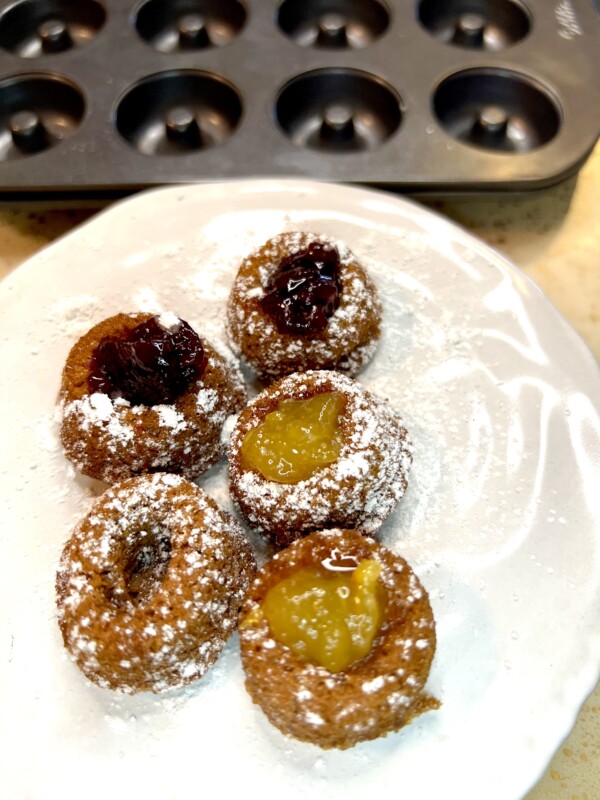
But dear ones, maybe there should be a little something else on the Hanukkah table. Something (gasp!) not fried. So I am beyond delighted award-winning culinary superstars Michael Solomonov, Jeffrey Yoskowitz, and Mark Bitterman, my other guests at this virtual Hanukkah party, have contributed some winners. And ahem, may I also suggest my Seven Sacred Foods Salad belongs on your Hanukkah table, too. It’s easy to toss together and served at room temperature. It’s perfect for parties. It’s goodness in a bowl, chewy with whole grains, fresh with herbs and greens, with bits of sweet surprise from fruit, and a Biblical backstory, too.
Jump to the recipe or stick around for some Biblical backstory.How to Make:
- Bring 1-1/2 cups of water or vegetable broth to boil in a medium saucepan. Pour in barley.
- Cover, reduce heat to low for 30 minutes, or until barley grains absorb all the liquid and are plump and tender. Set barley aside.
- Cook freekeh in the same manner, with the remaining 1-1/2 cups water or vegetable broth for 30 minutes, until the grains have plumped and absorbed all the liquid.
- Spoon barley and freekeh into a large bowl and stir to combine.
- Drizzle in olive oil and mix in with a light hand. Add chopped figs, dates and grape halves.
- Season with sea salt and freshly ground pepper. Drizzle in pomegranate molasses and give another light mix to incorporate.
- Set aside at room temperature and allow ingredients to get to know each other for about 30 minutes.
- Just before serving, gently mix in, greens, keeping everything light. Taste again for salt and pepper.
- Garnish with chopped pistachios, if desired.
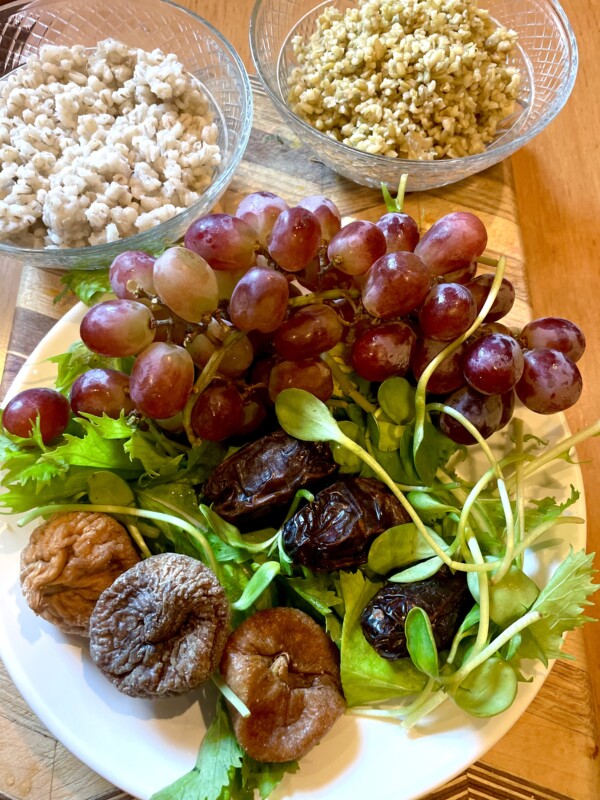
Biblical backstory
The seven sacred foods in my salad come from Deuteronomy:
For Adonai your God is bringing you into a good land, a land with streams and springs and fountains issuing from plain and hill; a land of wheat and barley, of vines, figs, and pomegranates, a land of olive trees and honey.
Some Biblical scholars — and I — believe what’s really meant here is dates and date honey, or silan.
Wheat, the most widely grown crop in the world, is in baked goods and pasta, of course, but also available in whole grain form (you know I love whole grains) like freekeh , Freekeh, green wheat kernels that have been cracked and smoked, has smoky flavor built right in. It’s available at most Middle Eastern markets, online and in some specialty stores. If you can’t find freekeh, go with wheat berries, spelt or Kamut, instead, with their own rich nutty flavor and whole grain chewiness.
So what’s with the Hanukkah oil thing? Back in 2 BCE, Jews needed oil to rekindle the lamp in the Holy Temple of Jerusalem. Somehow, the little amount we had was enough to last eight days. A miracle! How that morphed into celebrating with latkes and sufganiyot isn’t clear, but no one’s arguing. Hanukkah gives Jews a reason to go full on goblin mode, (OUP’s word of the year — technically two words ). an excuse to indulge, and be observant too.
The secret to frying is heat —hot surface, hot, hot oil.
It is possible to have an FOK—compliant oil-free Hanukkah. But it seems kinda sad.
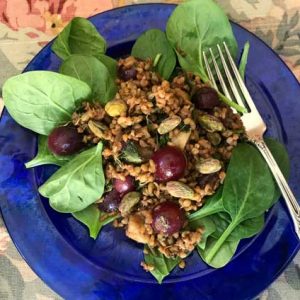
Seven Sacred Foods Salad
Ingredients
- 1/2 cup barley rinsed and drained
- 1/2 cup freekeh rinsed and drained
- 3 cups water or vegetable broth
- 2 tablespoons olive oil
- 3 dried figs chopped
- 3 dried Medjool dates chopped
- 2 dozen seedless red grapes halved
- sea salt and freshly ground pepper
- 2 tablespoons pomegranate molasses
- 4 cups assorted leafy greens and herbs chopped, such as arugula, parsley, mint, spinach, alfalfa sprouts, pea shoots, coriander, kale — choose what’s fresh and in season
- 1/3 cup pistachios chopped (optional)
Instructions
- Bring 1-1/2 cups of water or vegetable broth to boil in a medium saucepan. Pour in barley. Cover, reduce heat to low for 30 minutes, or until barley grains absorb all the liquid and are plump and tender. Set barley aside.
- Cook freekeh in the same manner, with the remaining 1-1/2 cups water or vegetable broth for 30 minutes, until the grains have plumped and absorbed all the liquid.
- If desired, let grains cool, then cover and refrigerate separately until you’re ready to assemble and eat. Allow barley and freekah to come to room temperature (or heat through at 350 degrees) before proceeding.
- Spoon grains into a large bowl. Drizzle in olive oil and mix in with a light hand. Add chopped figs, dates and grape halves.
- Season with sea salt and freshly ground pepper. Drizzle in pomegranate molasses and give another light mix to incorporate.
- Set aside at room temperature and allow ingredients to get to know each other for about 30 minutes.
- Just before serving, gently mix in, greens, keeping everything light. Taste again for salt and pepper. Garnish with chopped pistachios, if desired.
More Hanukkah recipes
- Nava Atlas’s crispy vegan latkes, which you can bake or fry. I’d recommend going for the whole Hanukkah experience. Fry ‘em.
- Everyone has their own spin on latkes, and Jeffrey Yoskowitz, author of The Gefilte Manifesto, points to this method made only with potatoes, adapted from the doyenne of Jewish cuisine Joan Nathan.
- Fran Costigan’s fluffy vegan sufganiyot.
- Since you have the oil out, my falafel are crispy, delectable and much easier to make than I’d feared.
- James Beard Award-winner Michael Solomonov’s velvety hummus goes beautifully with falafel. Great with anything, really. It’s that good.
- My black-eyed peas fragrant with fennel are another Hanukkah favorite.
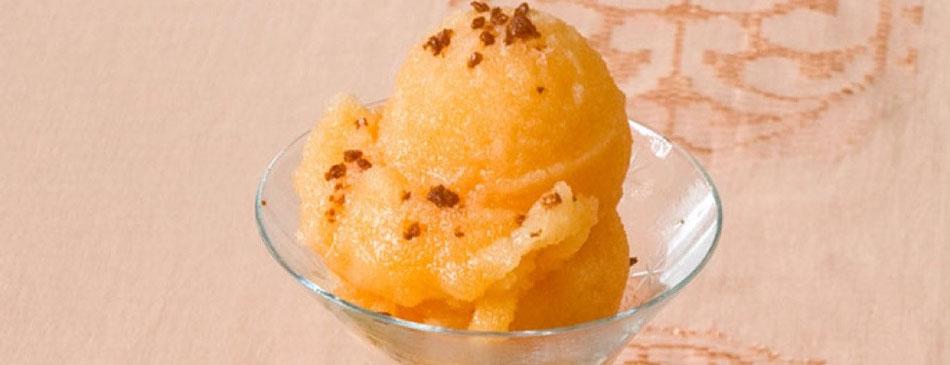
- James Beard award-winning author Mark Bitterman offers his recipe for white balsamic melon sorbet, the perfect restorative after a rich meal. Looking for ruby sea salt? Bitterman’s shop The Meadow’s got you covered for that and more.
- Even more holiday recipes at JewishVeg.com. And keep the party going! Join Jewish Veg’s Hanukkah Gala tomorrow.
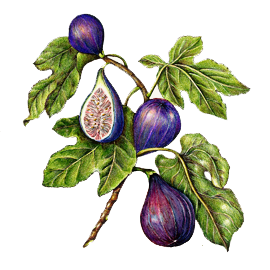
Leave a Reply